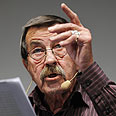
German author Guenter Grass
צלום: AFP
Germans at odds with Grass on Israel
German poll disagrees with renowned author Guenter Grass' criticism of Israel as results indicate 48% of Germans think Iran poses biggest threat while only 18% say Israel does
Nearly one in two Germans believe Iran poses a bigger threat to world peace than Israel, according to a poll on Sunday, disagreeing with renowned German author Guenter Grass whose criticism of the Jewish state triggered an international outcry.
Israel declared the Nobel Prize literature laureate Grass "persona non grata" last month after he published a poem saying it threatened world peace in its standoff with Tehran and that it must not be allowed to launch military strikes against Iran.
Relates stories:
- German author Grass says Israel endangers world peace Netanyahu: Guenter Grass poem 'shameful' Germany to honor 3rd Reich soldiers?
Grass's words were also denounced by mainstream political parties in Germany, where any strong condemnation of Israel is taboo because of the Nazi-perpetrated Holocaust.
Israel, widely believed to have the Middle East's only nuclear weapons, has threatened to take military action, with or without US support, to halt what it sees as a nuclear threat from Iran. Tehran says its nuclear programme is purely peaceful.
The poll, published in Die Welt am Sonntag newspaper along with a lengthy interview with Israeli Prime Minister Benjamin Netanyahu, showed 48 percent of Germans thought Iran posed the biggest threat to peace while 18 percent said Israel was.
A further 22 percent said Iran and Israel were an equal threat to world peace. The rest of those taking part in the Infratest/DIMAP survey expressed no opinion.
More than half of all those surveyed said they believed Iran's nuclear program posed a threat to Israel.
Grass, 84, most famous for his 1959 novel "The Tin Drum", denies he is anti-Semitic. He has urged his countrymen for decades to come to terms with their Nazi past, but his moral authority has never fully recovered from his admission in 2006 that he once served in Adolf Hitler's Waffen SS.
After the outcry over his poem, entitled "What must be said", Grass said that in retrospect he would have phrased his criticism of Israel differently to make clear he was "primarily talking about the (Netanyahu) government".
Grass has said the Nazi past is not an excuse for Germans to refrain from criticising present Israeli policies -- a view endorsed by three quarters of Germans in Sunday's poll who said Israel should be subject to criticism just as any other nation.
- Receive Ynetnews updates directly to your desktop










